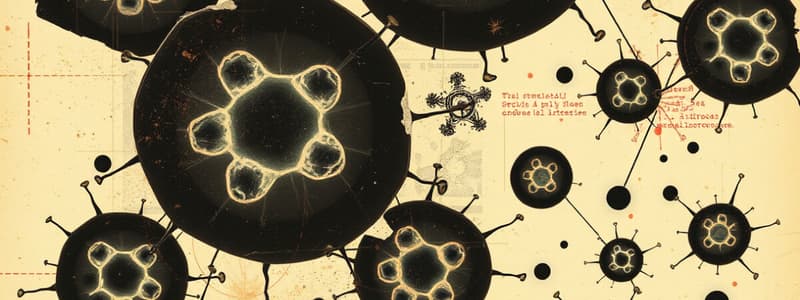Podcast
Questions and Answers
What role do helper T cells play in the immune response?
What role do helper T cells play in the immune response?
- They create antibodies against antigens.
- They directly attack invading pathogens.
- They produce memory T cells.
- They stimulate the production of B cells. (correct)
What is the primary function of memory B cells?
What is the primary function of memory B cells?
- To destroy pathogens directly.
- To remember antigens for future encounters. (correct)
- To produce macrophages.
- To stimulate T cells.
Which of the following accurately describes natural immunity?
Which of the following accurately describes natural immunity?
- Immunity passed from mother to child through breast milk. (correct)
- Immunity developed through vaccination.
- Immunity formed in a laboratory setting.
- Immunity acquired after an infection.
How do vaccines contribute to immunity?
How do vaccines contribute to immunity?
What is the primary difference between antigens and antibodies?
What is the primary difference between antigens and antibodies?
What are the primary barriers in the immune system that help prevent pathogen entry?
What are the primary barriers in the immune system that help prevent pathogen entry?
What happens after the first few months of a baby's life regarding their immune system?
What happens after the first few months of a baby's life regarding their immune system?
What role do killer T cells have in the immune system?
What role do killer T cells have in the immune system?
Which type of lymphocyte is primarily responsible for directly attacking cancer cells and viruses?
Which type of lymphocyte is primarily responsible for directly attacking cancer cells and viruses?
What is the primary function of antibodies in the immune response?
What is the primary function of antibodies in the immune response?
How are T cells activated in the immune response?
How are T cells activated in the immune response?
What role do macrophages play in the lymphatic system?
What role do macrophages play in the lymphatic system?
Which of the following statements best describes antigens?
Which of the following statements best describes antigens?
What is the main difference between natural immunity and acquired immunity?
What is the main difference between natural immunity and acquired immunity?
Which cells are responsible for producing antibodies?
Which cells are responsible for producing antibodies?
What role does the thymus play in the immune system?
What role does the thymus play in the immune system?
What happens when the body first encounters an antigen?
What happens when the body first encounters an antigen?
What is the role of white blood cells in the nonspecific immune response?
What is the role of white blood cells in the nonspecific immune response?
Which statement about the specific immune response is true?
Which statement about the specific immune response is true?
What happens to the body temperature as part of the immune response to infection?
What happens to the body temperature as part of the immune response to infection?
Which cells are responsible for memory in the immune system?
Which cells are responsible for memory in the immune system?
What is the function of interferon in the immune response?
What is the function of interferon in the immune response?
How does the body recognize previously encountered pathogens?
How does the body recognize previously encountered pathogens?
What role do macrophages play in the immune system?
What role do macrophages play in the immune system?
What distinguishes natural immunity from acquired immunity?
What distinguishes natural immunity from acquired immunity?
Which of the following statements correctly describes B cell function?
Which of the following statements correctly describes B cell function?
What is the significance of a fever during infection?
What is the significance of a fever during infection?
What is the primary role of T cells in the immune response?
What is the primary role of T cells in the immune response?
How do antibodies differ from antigens?
How do antibodies differ from antigens?
What is the distinction between natural and acquired immunity?
What is the distinction between natural and acquired immunity?
What role do macrophages play in the immune system?
What role do macrophages play in the immune system?
How are B cells activated in the immune response?
How are B cells activated in the immune response?
Flashcards are hidden until you start studying
Study Notes
Immunity Overview
- Memory B cells and T cells remember pathogens for faster response upon re-exposure.
- T cells are classified into helper cells, which activate B cells, and killer cells, which destroy pathogens.
- Natural immunity protects against certain pathogens unique to specific species; humans are not affected by animal pathogens and vice versa.
Barriers to Infection
- Physical barriers include skin, tears, mucous membranes, saliva, and stomach acid, which prevent pathogen entry.
- Skin acts as a protective wall, producing salty sweat that repels most pathogens.
- Tears and saliva contain chemicals that kill certain microorganisms, aiding defensive measures.
- Mucous membranes trap and destroy pathogens and line moist body areas like the mouth and nose.
Immune System Function
- Babies inherit antibodies from mothers at birth and through breastfeeding, enhancing early immunity.
- The immune system creates memory B and T cells upon first exposure to antigens, allowing for quicker future responses.
- Vaccines introduce antigens to stimulate antibody production and build immunity without causing disease.
Lymphatic System Role
- The lymphatic system is crucial in defending the body and contains lymph fluid that circulates and fights pathogens.
- Three types of lymphocytes are central to immunity: B cells (produced in bone marrow), T cells (produced in the thymus), and NK (natural killer) cells, which target cancer and viruses.
- Macrophages in the lymph destroy foreign substances and eliminate waste.
Antigens and Antibodies
- Antigens are substances that provoke an immune response, while antibodies are proteins created to bind to and neutralize these antigens.
- Lymphocytes, activated upon recognizing pathogens' antigens, initiate a tailored immune response to eliminate threats.
Immune Responses
- Nonspecific immune response occurs initially, reacting the same way to any foreign substance, often leading to inflammation and increased blood flow to the affected area.
- Specific immune responses arise if pathogens bypass initial defenses, providing customized attacks against recognized invaders.
- Previous encounters with pathogens allow for a faster and more efficient immune response during re-exposure.
Pathogen Management
- Fever is a physiological response that elevates body temperature, hindering pathogen multiplication and enhancing white blood cell activity.
- The immune system remains vigilant, recognizing and responding more efficiently to previously encountered pathogens, enhancing overall immunity.
Major Barriers Summary
- Five primary barriers against pathogens: skin, tears, saliva, mucous membranes, and stomach acid.
- These barriers serve as the first line of defense in preventing pathogen entry and reducing infection risk.
Studying That Suits You
Use AI to generate personalized quizzes and flashcards to suit your learning preferences.




